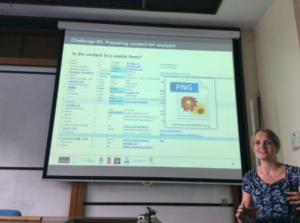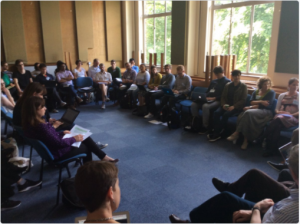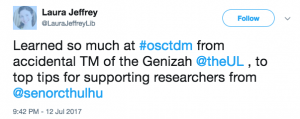Text and Data Mining (TDM) is the process of digitally querying large collections of machine-readable material, extracting specific information and, by analysis, discovering new information about a topic.
In February 2017, a group University of Cambridge staff met to discuss “Text and Data Mining Services: What can Cambridge libraries offer?” It was agreed that a future library Text and Data Mining (TDM) support service could include:
- Access to data from our own collections
- Advice on legal issues, what publishers allow, what data sets and tools are available
- Registers on data provided for mining and TDM projects
- Fostering agreements with publishers.
This blog reports on some of the activities, events and initiatives, involving libraries at the University of Cambridge, that have taken place or are in progress since this meeting (also summarised in these slides). Raising awareness, educating, and teasing out the issues around the low uptake of this research process have been the main drivers for these activities.
March 2017: RLUK 2017 Conference Workshop
The Office of Scholarly Communication (OSC) and Jisc ran a workshop at the Research Libraries UK 2017 conference to discuss Research Libraries and TDM. Issues raised included licencing, copyright, data management, perceived lack of demand, where to go for advice within an institution or publisher, policy and procedural development for handling TDM-related requests (and scaling this up across an institution) and the risk of lock-out from publishers’ content, as well as the time it can take for a TDM contract to be finalised between an institution and publisher. The group concluded that it is important to build mechanisms into TDM-specific licencing agreements between institutions and publishers where certain behaviours are expected. For example, if suspicious activity is detected by a publisher’s website, it would be better not to automatically block the originating institution from accessing content, but investigate this first (although this may depend on systems in place), or if lock-out happens and the activity is legal, participants suggested that institutions should explore compensation for the time that access is lost if significant.
July 2017: University of Cambridge Text and Data Mining Libguide
Developed by the eResources Team, this LibGuide explains about Text and Data Mining (TDM): what it is, what the legal issues are, what you can do and what you should not try to do. It also provides a list of online journals under license for TDM at the University of Cambridge and a list of digital archives for text mining that can be supplied to the University researchers on a disc copy. Any questions our researchers may have about a TDM project, not answered through the LibGuide, can be submitted to the eResources Team via an enquiry form.
July 2017: TDM Symposium
The OSC hosted this symposium to provide as much information as possible to the attendees regarding TDM. Internal and external speakers, experienced in the field, spoke about what TDM is and what the issues are; research projects in which TDM was used; TDM tools; how a particular publisher supports TDM; and how librarians can support TDM.
At the end of the day a whole-group discussion drew out issues around why more TDM is not happening in the UK and it was agreed that there was a need for more visibility on what TDM looks like (e.g. a need for some hands-on sessions) and increased stakeholder communication: i.e. between publishers, librarians and researchers.
November 2017: Stakeholder communication and the TDM Test Kitchen
This pilot project involves a publisher, librarians and researchers. It is providing practical insight into the issues arising for each of the stakeholders: e.g. researchers providing training on TDM methods and analysis tools, library support managing content accessibility and funding for this, and content licencing and agreements for the publisher. We’ll take a more in-depth look at this pilot in an upcoming blog on TDM – watch this space.
January 2018: Cambridge University Library Deputy Director visits Yale
The Yale University Library Digital Humanities Laboratory provides physical space, resources and a community within the Library for Yale researchers who are working with digital methods for humanities research and teaching. In January this year Dr Danny Kingsley visited the facility to discuss approaches to providing TDM services to help planning here. The Yale DH Lab staff help out with projects in a variety of ways, one example being to help researchers get to grips with digital tools and methods. Researchers wanting to carry out TDM on particular collections can visit the lab to do their TDM: off-line discs containing published material for mining can be used in-situ. In 2018, the libraries at Cambridge have begun building up a collection of offline discs of specific collections for the same purpose.
June 2018: Text and Data Mining online course
The OSC collaborated with the EU OpenMinTeD project on this Foster online course: Introduction to Text and Data Mining. The course helps a learner understand the key concepts around TDM, explores how Research Support staff can help with TDM and there are some practical activities that even allow those with non-technical skills try out some mining concepts for themselves. By following these activities, you can find out a bit more about sentence segmentation, tokenization, stemming and other processing techniques.
October 2018: Gale Digital Scholar Lab
The University of Cambridge has trial access to this platform until the end of December: it provides TDM tools at a front end to digital archives from Gale Cengage. You can find out more about this trial in this ejournals@cambridge blog.
In summary…
Following the initial meeting to discuss research support services for TDM, there have been efforts and achievements to raise awareness of TDM and the possibilities it can bring to the research process as well as to explore the issues around the low usage of TDM in the research community at large. This is an on-going task, with the goal of increased researcher engagement with TDM.



